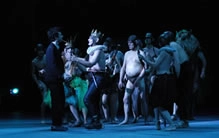Peer Gynt
March 12 2005 to April 16 2005
In the beginning, a mother accuses her son of lying. In the end, a woman asks her partner to dream. Between this beginning and this end, written between the the margins of femininity, a story of a man unfolds, a story called Peer Gynt, about a man named Peer Gynt. This man, along with stage heros like Faust, Don Juan, Baal or Roberto Zucco, shares the privilege of lending his name to the play he tells, but most of all a very particular sort of theatrical energy that gives the play in question a seismic quality. Writing a play like this is more like recording the trembling (yet precise) trajectories of these restless figures whose speed crosses the world "like an open razor," to use the words of Woyzzeck. Peer is, like the others, first of all a slipstream, more or less captured on the screen of writing. It's no accident he calls a shooting star "sure". "Peer Gynt, his life, his work"? No doubt. But only if we underline that the three terms are more inextricably linked than ever before. This life-work reads like an enormous lie or an endless dream without end, a lie in which the liar is carried away, a dream in which the dreamer himself is captured: the writing of a legend before our very eyes.
Maybe that's what fascinated Patrick Pineau. His first production at the Odeon Theater (Monsieur Armand, or Garrincha, by Serge Valletti) already revealed a storyteller possessed in every sense of the word. Haunted, fooled by his own legend. And he confided the incarnation of this vertigo to Eric Elmosnino, his brother in theater, after bringing him on a first team project to do Gorky's The Barbarians, a performance that made Vincent Baudriller invite him to do Peer Gynt in the Cour d'Honneur in the Palais des Papes in Avignon.
Peer Gynt: five acts that make an entire life. Because of his true-lying, energy and absence (a necessary prerequisite because no one is a prophet in his own country), because he moves through all stages of being, real or not, Peer the outcast, the hunted, the slightly drunk, slightly mad dreamer ends up transforming into a semi-mythical creature. Peer tells himself tales, lies to himself, creates lives and dreams for himself - all in one. And in this way, he is or he becomes who he is. This quest for the "Self" gives Peer, and the play that carries his name, a sort of extraordinary exploratory momentum, a power of acceleration that tears them from their initial limits. Not only does the hero leave behind a furious mother and a seduced wife by going into the mountains: but all fiction is delivered from the weight of "realism". Like a rocket reaching escape velocity enters into the kingdom where it floats weightlessly, Peer Gynt is the poem of all the escapes and partings far from the family and the weight of one's origins, far from marriage and family responsibility, far from all community, be it of men or of trolls, far from all that could inhibit freely erratic movement of this naive and crazy ambition to live, of the exceptionally insolent vitality of this craze for identity.
Who is this Peer and what does he live? What happens on the long pathway running from mother to companion? Ibsen took great care not to give an overly clear answer. The Gyntian existence will never be entirely solved. "To sleep, perchance to dream," said Hamlet as he contemplated death; "Sleep and dream, my son," says Solvejg to Peer as he perhaps starts to live. But though he doesn't die, Peer-the-Mythical eventually is even more mortal. For in this play where all is possible, where destinies seem like masks waiting to be removed, where all hidden corners of existence reveal themselves to the hero, where the fantastic is used with complete liberty, there is one law which is never suspended. Peer ages. Time moves forward, death approaches along with the nothingness waiting there in ambush, and youth won't return. What does it mean to "be oneself"? At the end of his quest, maybe Peer still doesn't know. And though he peels his life away, layer after layer, role after role, as we peel an onion (and he says so in a famous monologue), his significant core undoubtedly seems to reduce to nothing. However, there's no existence other than this very one. And he doesn't want another life to offer to the woman who has been waiting for him. No matter if the hereafter is Pagan or Christian. Peer refuses to be pounded away at, recast, thrown back to the masses and anonymity. Peer isn't dead yet. He forever insists on being unique, the master and author of his biography. He insists on signing the material that will be his life, opposing any creator with his inalienable right as a creature: to have left a mark on time's too smooth skin.



